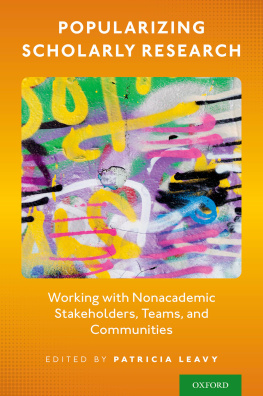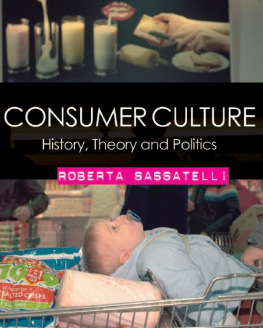Patricia L Sunderland - Doing Anthropology in Consumer Research
Here you can read online Patricia L Sunderland - Doing Anthropology in Consumer Research full text of the book (entire story) in english for free. Download pdf and epub, get meaning, cover and reviews about this ebook. year: 2016, publisher: Routledge, genre: Politics. Description of the work, (preface) as well as reviews are available. Best literature library LitArk.com created for fans of good reading and offers a wide selection of genres:
Romance novel
Science fiction
Adventure
Detective
Science
History
Home and family
Prose
Art
Politics
Computer
Non-fiction
Religion
Business
Children
Humor
Choose a favorite category and find really read worthwhile books. Enjoy immersion in the world of imagination, feel the emotions of the characters or learn something new for yourself, make an fascinating discovery.

- Book:Doing Anthropology in Consumer Research
- Author:
- Publisher:Routledge
- Genre:
- Year:2016
- Rating:4 / 5
- Favourites:Add to favourites
- Your mark:
- 80
- 1
- 2
- 3
- 4
- 5
Doing Anthropology in Consumer Research: summary, description and annotation
We offer to read an annotation, description, summary or preface (depends on what the author of the book "Doing Anthropology in Consumer Research" wrote himself). If you haven't found the necessary information about the book — write in the comments, we will try to find it.
Doing Anthropology in Consumer Research — read online for free the complete book (whole text) full work
Below is the text of the book, divided by pages. System saving the place of the last page read, allows you to conveniently read the book "Doing Anthropology in Consumer Research" online for free, without having to search again every time where you left off. Put a bookmark, and you can go to the page where you finished reading at any time.
Font size:
Interval:
Bookmark:


2 Park Square, Milton Park, Abingdon, Oxon OX14 4RN
711 Third Avenue, New York, NY 10017, USA
Product or corporate names may be trademarks or registered trademarks, and are used only for identification and explanation without intent to infringe.
Doing anthropology in consumer research / Patricia L. Sunderland and
Rita M. Denny.
p. cm.
ISBN 978-1-59874-090-5 (hardback: alk. paper) -
ISBN 978-1-59874-091-2 (pbk.: alk. paper)
1. Business anthropology--Research. 2. Consumers--Research. I.
Denny, Rita Mary Taylor, 1956- II. Title.
GN450.8.S86 2007 658.834--dc22 2007034206
and (c) Patricia Sunderland and Rita Denny.
Figure 5.1 reprinted with permission of Photosport Ltd,
P.O. Box 99804, Newmarket, Auckland, New Zealand.
Two of the most patient and supportive souls this world has ever produced.
A master of the nuanced cadences in her mother's replies (grunts) to her home-from-school greeting, "How's the book?"
| Part I Introduction |
| Part II Engaging Approaches |
by Donald D. Stull |
by John F. Sherry Jr. |
| Part III Engaging Entanglements |
| by Russell Belk |
by Vilma Santiago-Irizarry and Frederic W Gleach |
| Part IV Engaging One Another |
| Image Accompanying the Article "Into the Wild Unknown of Workplace Culture: Anthropologists Revitalize Their Discipline" in U.S. News & World Report, August 10, 1998 |
| An Example of roasted addiction's Messaging Brought by a New Zealand Participant to the Seminar |
| Canned Milk Poured into a Plastic Bag as an Ingredient of Street Coffee |
| Offices: Infused with Aesthetic, Functional, and Symbolic Elements |
| An Array of Files on the Floor Mimicking the Computer's Desktop |
| The Actual Desktop, i.e., the Desk's, Arrayed with Files Whose Information Was Less Immediately Needed |
| The Computer's Desktop Was Visually Parsed by File Folders and Photos of His Son |
| Icon of the Trans-Tasman Region, Australia-New Zealand Rugby Match |
| Icon of New Zealand, "Boy with Tiki," Photo Diary, New Zealand |
| Icon of the Trans-Tasman Region, the Barbeque, Photo Diary, New Zealand |
| A Photo Diary Image, in which the Respondent Took a Photo of Herself Standing in a Pool of Water |
| One of Many Observations of Aucklanders' Relationship to Nature |
| Diary Image Signaling "Modern" New Zealand: Dad with Baby Updates Traditional Masculinity |
| Women's Breastfeeding Offered as a Unique, Alternative Iconic Image of New Zealand |
| Hand-imported Tequila Almendrado"Authentic" Mexican Tequila in Recycled Johnnie Walker Bottle |
Font size:
Interval:
Bookmark:
Similar books «Doing Anthropology in Consumer Research»
Look at similar books to Doing Anthropology in Consumer Research. We have selected literature similar in name and meaning in the hope of providing readers with more options to find new, interesting, not yet read works.
Discussion, reviews of the book Doing Anthropology in Consumer Research and just readers' own opinions. Leave your comments, write what you think about the work, its meaning or the main characters. Specify what exactly you liked and what you didn't like, and why you think so.









